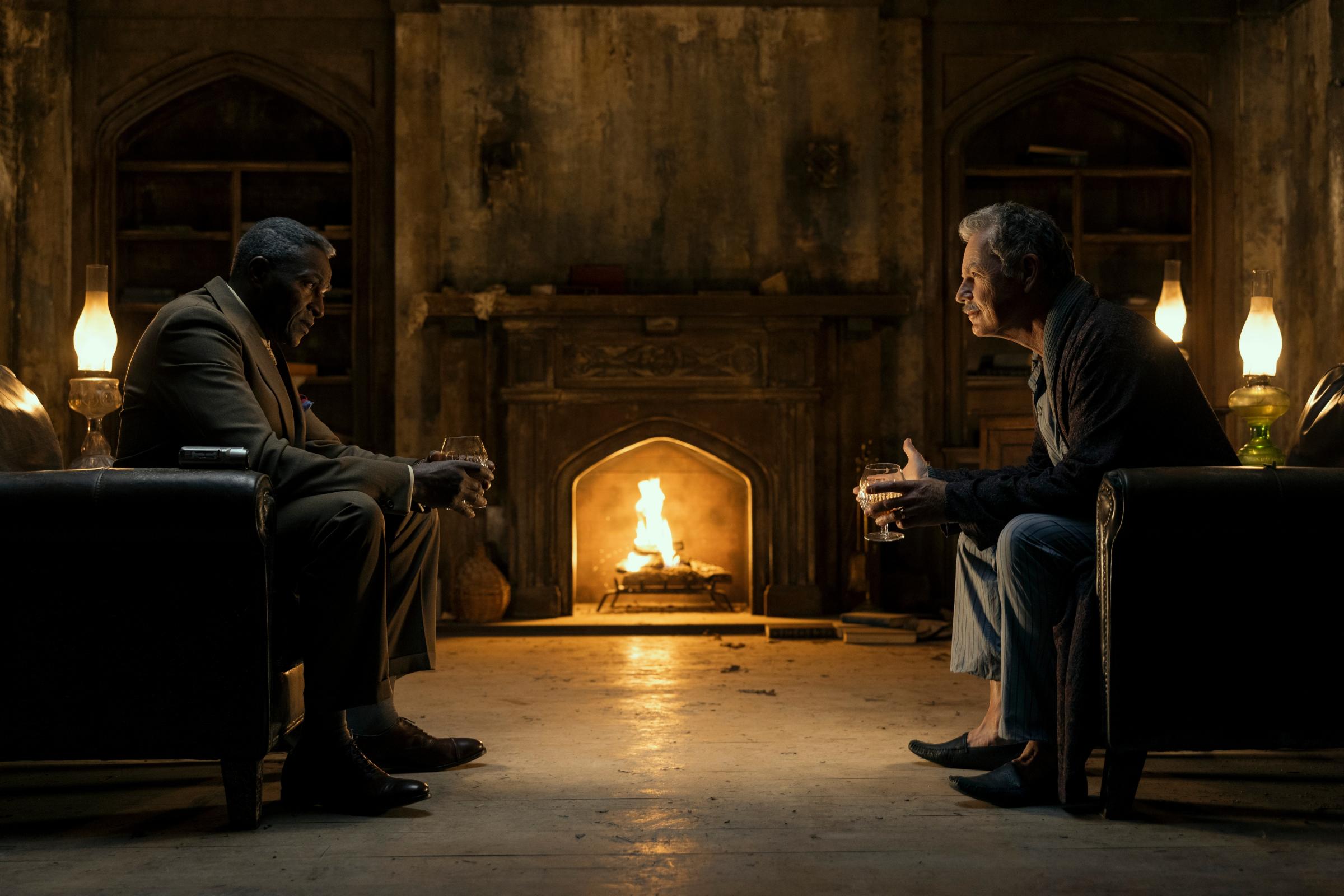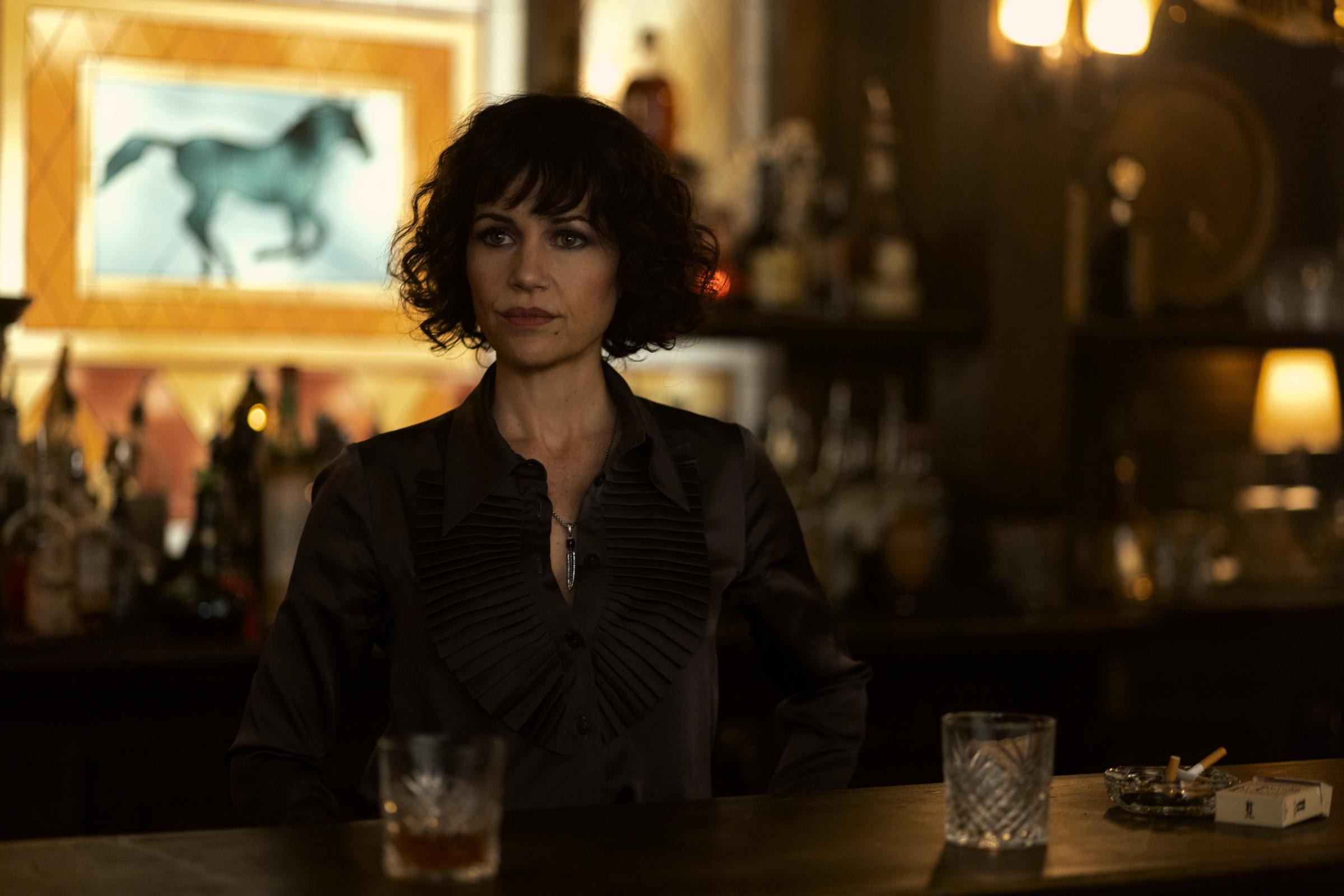Warning: This post contains spoilers for The Fall of the House of Usher.
From the start of the first episode of The Fall of the House of Usher, we know that all of Roderick Usher's children are dead. It's the how and the why of their deaths that plays out over the course of Mike Flanagan's new horror anthology series, now streaming on Netflix.
Inspired by the work of Edgar Allan Poe, House of Usher traces the downfall of the uber-wealthy Usher family and their corrupt drug company, Fortunato Pharmaceuticals. The story centers on Usher family patriarch and Fortunato CEO Roderick (Bruce Greenwood), who, as the show begins, calls up his longtime rival, assistant U.S. attorney C. Auguste Dupin (Carl Lumbly), to come hear his confession following the deaths of all six of his adult children (by five different mothers)—Frederick (Henry Thomas), Tamerlane (Samantha Sloyan), Victorine (T'Nia Miller), Napoleon (Rahul Kohli), Camille (Kate Siegel), and Prospero (Sauriyan Sapkota)—in the span of a week.
The overarching narrative of The Fall of the House of Usher loosely follows Poe's 1839 short story of the same name, with Roderick recounting his decades-spanning tale to Auggie inside his decrepit childhood home. Throughout the evening, Roderick is tortured by visions of his dead children—who appear to him as he relays the gruesome ways in which each of them met their end—while banging sounds that he says are coming from his twin sister, Fortunato COO Madeline Usher (Mary McDonnell), can be heard emanating from the home's basement.

As Roderick nears the conclusion of his story, which jumps back and forth between his early years working at Fortunato and the events that led up to each of his children's deaths, he finally arrives at the fateful night that changed everything, New Year's Eve of 1979. Rodrick reveals that after plotting to betray a young Auggie (Malcolm Goodwin), then a Medicare fraud investigator, by lying about Fortunato's illegal business practices, young Roderick (Zach Gilford) and Madeline (Willa Fitzgerald) carried out the final phase of their plan to take over the company by drugging and subsequently burying then-Fortunato CEO Rufus Griswold (Michael Trucco) alive inside the basement wall of Fortunato headquarters—a nod to Poe's 1846 short story "The Cask of Amontillado."
The siblings then made their way to a local bar to establish an alibi. It was there that they met a bartender named Verna (Carla Gugino), the supernatural entity responsible for killing off the Usher clan, and made a deal that changed the course of their lives forever.
Read more: How The Fall of the House of Usher Reimagines the Gothic Horror of Edgar Allan Poe
What deal did the Ushers make with Verna?
Once Roderick and Madeline were the only ones left in the bar after a long night of drinking, Verna revealed to the twins that she knew what they had done. But, if they agreed to her terms, she could guarantee that they would not only get away with Rufus' murder but also rise to control Fortunato's billion-dollar painkiller empire and never be convicted of a single crime.

In exchange for this protection, both Roderick and Madeline had to consent to the bargain that at the end of Roderick's life, just before he was fated to die anyway, his entire bloodline would die with him. Roderick and Madeline would also have to die at the same time, leaving this world the same way they came into it. The siblings agreed to the deal, left the bar, and soon after became convinced that the whole thing had been a shared delusion.
“Early in his life, [Roderick] had a conversation with somebody who promised him an effortless life in return for something that he didn’t quite believe could happen,” Greenwood told Netflix of is character's story arc. “And now that’s coming home to roost.”
How does The Fall of the House of Usher end?
Decades later, once it became clear that Verna was the one killing off the Usher children, Madeline tried to sidestep the deal by convincing Roderick to kill himself. But Verna wasn't willing to let him get off that easy and brought him back to face the full extent of his reckoning, the death of his granddaughter Lenore (Kyliegh Curran), the only morally good Usher.
Roderick then invited Madeline over to their childhood home, where he poisoned her drink and set to work mummifying her. It was shortly after this that Auggie arrived at the house to hear Roderick's confession. Only, as evidenced by the noises coming from the basement, Madeline wasn't quite dead.
As Roderick finishes his story, an eyeless and bloodied Madeline suddenly bursts out of the basement and attacks Roderick as the house begins to crumble around them. In a final burst of strength, Madeline strangles Roderick to death as Auggie flees collapsing home—a sequence that mirrors the ending of Poe's "House of Usher."
In the final minutes of the episode, it's revealed that Roderick's second wife, Juno (Ruth Codd), inherited Fortunato and went on to repurpose the company into the Phoenix Foundation to fund rehabilitation programs, while the Usher family's fixer, lawyer Arthur Pym (Mark Hamill), became the only person to face a conviction from the Fortunato case—having denied Verna's offer of immunity in exchange for the sacrifice of a valuable asset—and would spend the rest of his life in prison.
As the series draws to a close, Verna—whose name is an anagram of the titular bird in Poe's classic 1845 poem "The Raven"—is shown placing an item on each of the Usher's graves that represents their respective downfalls, closing the loop of her karmic retribution.
More Must-Reads From TIME
- The 100 Most Influential People of 2024
- Coco Gauff Is Playing for Herself Now
- Scenes From Pro-Palestinian Encampments Across U.S. Universities
- 6 Compliments That Land Every Time
- If You're Dating Right Now , You're Brave: Column
- The AI That Could Heal a Divided Internet
- Fallout Is a Brilliant Model for the Future of Video Game Adaptations
- Want Weekly Recs on What to Watch, Read, and More? Sign Up for Worth Your Time
Write to Megan McCluskey at megan.mccluskey@time.com